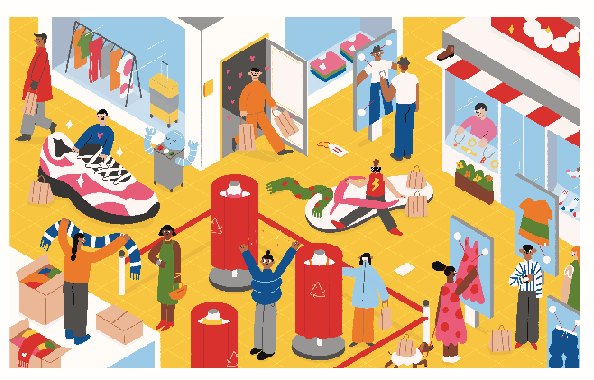The fashion industry is a booming sector in Nigeria and Africa as a whole.
According to a report by the Nigerian Bureau of Statistics, the textile, apparel, and footwear industry contributed 0.24% to Nigeria’s GDP in Q1 2021, and the sector employed over 7 million people in the country.
NBS stressed that, the textile, apparel, and footwear industry contributes about 10% to Nigeria’s manufacturing GDP and employs over 2 million people.
Nigeria, being the largest economy in Africa, presents a vast market for the fashion industry. The country is known for its diverse cultural heritage, which has greatly influenced fashion styles and designs. This has made Nigeria a hub for fashion in West Africa.
Additionally, the country’s strategic location and membership in several trade agreements, such as the African Continental Free Trade Agreement (AfCFTA), provide opportunities for fashion businesses to expand to other African countries and beyond.
Export opportunities for the Nigerian fashion industry are also promising as the country has a favorable climate for cotton cultivation, which is a primary raw material for clothing production.
Furthermore, the African Continental Free Trade Area (AfCFTA) agreement provides a tariff-free market for Nigerian fashion products in other African countries, which will increase the competitiveness of Nigerian fashion brands in the African market.
The agreement provides an excellent opportunity for the fashion industry in Nigeria and Africa to expand and create new markets for its products.
Fashion
Fashion is a popular style or trend in clothing, accessories, and personal grooming. It refers to the styles, designs, and trends that are favored and adopted by a specific group of people or culture.
The fashion industry can be defined as a business that involves the creation, production, marketing, and selling of clothing, footwear, accessories, and other lifestyle products. It encompasses various subsectors such as haute couture, ready-to-wear, luxury goods, and streetwear.
The fashion industry in Nigeria is estimated to be worth over $2 billion and is expected to continue to grow. The industry has seen a rise in the number of fashion designers, models, fashion houses, and fashion events.
Fashion Business Benefits In Nigeria
The fashion industry in Nigeria and Africa is a major employer of labour, providing jobs for a large number of people, especially, women and youth, thereby reducing unemployment rates.
The fashion industry is also a significant contributor to the GDP of Nigeria and Africa, generating revenue from exports, taxes, and other economic activities.
It showcases the rich cultural heritage of Nigeria and Africa, providing a platform for the display and preservation of traditional designs, fabrics, and styles.
On diversification of the economy, Fashion business is a non-oil sector and provides an avenue for the diversification of the economy, reducing the over-reliance on oil even as it has created a lot of entrepreneurs in Nigeria and Africa, allowing people to start small businesses and grow into larger ones.
Meanwhile, the fashion industry provides opportunities for the creation of value chains, including raw material sourcing, production, distribution, and retail.
While the industry promotes social and environmental responsibility through the use of sustainable materials, ethical production, and fair trade practices, fashion industry also provides opportunities for exports, showcasing Nigerian and African designs to the rest of the world, generating foreign exchange for the country.
Fashion Business Opportunities
There are several opportunities and chain of businesses one can leverage on to make quick investment returns. They include;
Manufacturing: Opportunities in garment and textile manufacturing for local and international markets.
Retail: Opening fashion boutiques, e-commerce fashion platforms, and fashion stores.
Fashion Design: Creating and selling unique fashion designs, producing fashion accessories and jewelry, designing and producing costumes for movies, TV shows, and stage performances.
Fashion Training and Education: Providing fashion training and workshops, opening fashion schools, and developing a skilled workforce for the fashion industry.
Fashion Styling: Offering styling services to clients, editorial styling for magazines, runway shows, and fashion events.
Fashion Photography: Providing fashion photography services for magazines, brands, and online platforms.
Textile Production: Developing and producing fabrics and textiles for the fashion industry, including indigenous fabrics like Aso-oke, Adire, and Ankara.
Fashion Event Planning: Organizing fashion shows, exhibitions, and trade fairs.
Fashion Consultancy: Providing consulting services to fashion startups, brands, and companies.
Fashion Accessories: Producing and selling fashion accessories like shoes, bags, hats, and belts.
Fashion Blogging and Influencing: Starting fashion blogs, vlogs, and social media influencing platforms to promote fashion brands and products.
Fashion Tech: Developing and producing fashion tech products like wearable technology, smart fabrics, and fashion apps.
Sustainable Fashion: Creating eco-friendly fashion lines and promoting sustainable fashion practices.
Conclusion
According to the founder of Legendary Gold Limited, Lexy Mojo Eyes, “Nigerian fashion and Cosmetic players are not doing as well as they should because we are still very young in the business and serious investors have not yet started looking at this sector as serious business. Players in this sector are still SMEs and not big conglomerates.
“Bernard Arnault who owns Louis Vuitton, Christian Dior, Givenchy, Tiffany’s, Marc Jacobs, Sephora, Fenty Beauty and so on is today the richest man in the world with $211 billion. He just over took Elion Musk. But if you have followed these brands closely, they have been there for decades and lots of huge, consented and deliberate funds were pumped into these brands over the years.”
While urging investors to start looking at the fashion and beauty industry including their value chains as the next oil and gold, he added that, “ These products are daily essentials. Everyone wears clothes and uses cosmetic products daily. So, this shows you the economic viability of these sectors.”





